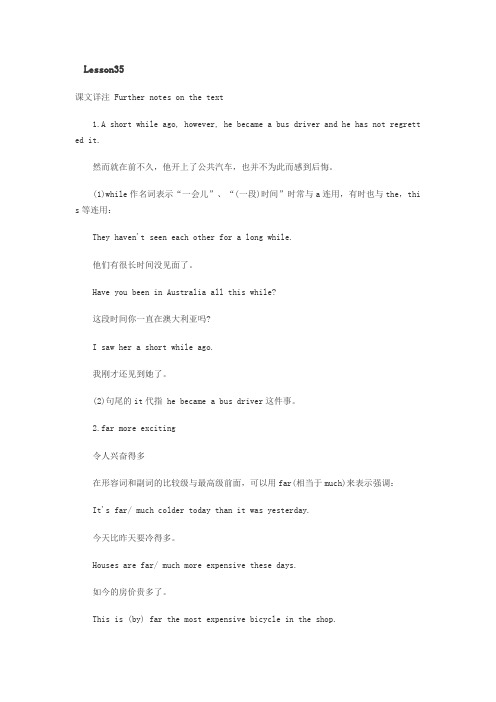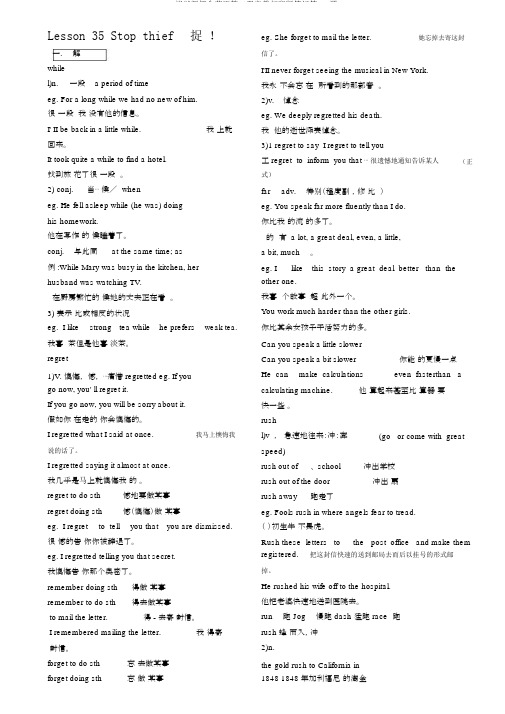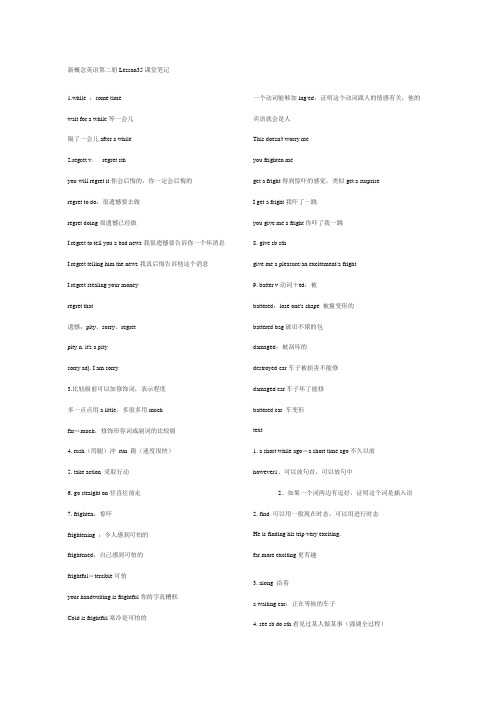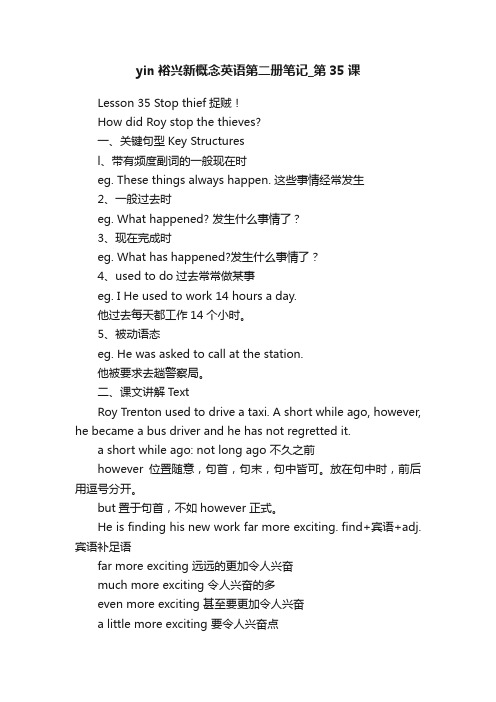裕兴新概念英语第二册笔记第35课
新概念英语2Lesson35

Lesson35课文详注 Further notes on the text1.A short while ago, however, he became a bus driver and he has not regrett ed it.然而就在前不久,他开上了公共汽车,也并不为此而感到后悔。
(1)while作名词表示“一会儿”、“(一段)时间”时常与a连用,有时也与the,thi s等连用:They haven't seen each other for a long while.他们有很长时间没见面了。
Have you been in Australia all this while?这段时间你一直在澳大利亚吗?I saw her a short while ago.我刚才还见到她了。
(2)句尾的it代指 he became a bus driver这件事。
2.far more exciting令人兴奋得多在形容词和副词的比较级与最高级前面,可以用far(相当于much)来表示强调:It's far/ much colder today than it was yesterday.今天比昨天要冷得多。
Houses are far/ much more expensive these days.如今的房价贵多了。
This is (by) far the most expensive bicycle in the shop.这是这家商店里最贵的自行车。
(比其他的要贵好多)3.… saw two thieves rush out of a shop and run towards a waiting car.……看到两个小偷从一家商店里冲出来,奔向等在那里的一辆汽车。
(1)这句话中,rush和run是two thieves的两个连续的动作。
see和其他一些感知动词(如 feel, hear, notice, smell, watch 等),可以用在动词+名词或代词宾语+不带to 的不定式结构中:I saw him climb through the window.我看见他爬进窗户。
新概念第二册课文翻译及学习笔记【Lesson34、35、36】

新概念第二册课文翻译及学习笔记【Lesson34、35、36】【课文】First listen and then answer the question.听录音,然后回答以下问题。
How long had the police taken to find his bicycle?Dan Robinson has been worried all week. Last Tuesday he received a letter from the local police. In the letter he was asked to call at the station. Dan wondered why he was wantedby the police, but he went to the station yesterday and nowhe is not worried anymore. At the station, he was told by a smiling policeman that his bicycle had been found. Five days ago, the policeman told him, the bicycle was picked up in a small village four hundred miles away. It is now being sentto his home by train. Dan was most surprised when he heardthe news. He was amused too, because he never expected the bicycle to be found. It was stolen twenty years ago when Dan was a boy of fifteen!【课文翻译】丹.鲁宾逊焦虑了整整一个星期。
裕兴新概念英语第二册完美打印版笔记第35课

Lesson 35 Stop thief 捉!一.解whilel)n. 一段 a period of timeeg. For a long while we had no new of him.很一段我没有他的信息。
I' II be back in a little while.我上就回来。
It took quite a while to find a hotel.找到旅花了很一段。
2) conj.当⋯候/wheneg. He fell asleep while (he was) doinghis homework.他在写作的候睡着了。
conj. 与此同at the same time; as例:While Mary was busy in the kitchen, herhusband was watching TV.在厨房繁忙的候她的丈夫正在看。
3)表示比或相反的状况eg. I like strong tea while he prefers weak tea.我喜茶但是他喜淡茶。
regret1)V. 懊悔,憾,⋯痛惜 regretted eg. If yougo now, you' ll regret it.If you go now, you will be sorry about it.假如你在走的你会懊悔的。
I regretted what I said at once.我马上懊悔我说的话了。
I regretted saying it almost at once.我几乎是马上就懊悔我的。
regret to do sth憾地要做某事regret doing sth憾(懊悔)做某事eg. I regret to tell you that you are dismissed.很憾的告你你被辞退了。
eg. I regretted telling you that secret.我懊悔告你那个奥密了。
新概念2册Lesson35课堂笔记

新概念英语第二册Lesson35课堂笔记1.while :some timewait f or a while等一会儿隔了一会儿af t er a while2.regret v. regret sthyou will regret it你会后悔的,你一定会后悔的regret to do:很遗憾要去做regret doing很遗憾已经做I regret to tell you a bad news我很遗憾要告诉你一个坏消息I regret telling him the news我真后悔告诉他这个消息I regret stealing your moneyregret that遗憾:pity、sorry、regretpity n. it's a pitysorry adj. I am sorry3.比较级前可以加修饰词,表示程度多一点点用a little,多很多用muchfar=much,修饰形容词或副词的比较级4. rush(用腿)冲run 跑(速度很快)5. take action 采取行动6. go straight on径直往前走7. f righten:惊吓frightening :令人感到可怕的frightened:自己感到可怕的fright f ul=terrible可怕your handwriting is f rightf ul你的字真糟糕Cold is f right f ul寒冷是可怕的一个动词能够加ing/ed,证明这个动词跟人的情感有关,他的宾语就会是人This doesn't worry meyou f righten meget a f right得到惊吓的感觉,类似get a surpriseI get a f right我吓了一跳you give me a f right你吓了我一跳8. give sb sthgive me a pleasure/an excitem ent/a fright9. batter v动词+ed:被battered:lose one's shape 被撞变形的battered bag破旧不堪的包damaged:被刮坏的destroyed car车子被损害不能修damaged car车子坏了能修battered car 车变形text1. a short while ago=a short time ago不久以前however1、可以放句首,可以放句中2、如果一个词两边有逗好,证明这个词是插入语2. f ind 可以用一般现在时态,可以用进行时态He is f inding his trip very exciting.far more exciting更有趣3. along 沿着a waiting car:正在等候的车子4. see sb do sth看见过某人做某事(强调全过程)5. see sb doing 看见某人正在做某事I see them danceI see them dancinghear sb doing/hear sb do如果全过程用do,过程中的一瞬监用doingbe f ull of = be f illed with装满I have a cup f ull of tea6. with 一旦出现在名词后代词后就做定语,出现在动词之后做状语he came in with a bookthe boy with a book came in7. drop/f all:掉sb drop sth,drop vt.由于不当心抓什么没抓住掉下去fall vi. sth f all从上往下落drop the moneyfall the money8. get away =run away逃跑by car /in the cardrive into 撞stopped his car/the car stoppeddamaged:毁坏stop拦住车子both men =two personsstop the card1、the driver stop the car2、其他人stopped the car:拦车stop thief捉賊捉,抓catchprefer ...to...更喜欢这个东西(和后面的东西比),宁可也不prefer+名词更喜欢I pref er tea to waterprefer+名词+to(prep.)+名词I pref er drinking tea to drinking waterprefer to(不定式的标志)+动词原形:更喜欢Rather than do sth不喜欢做某事would rather do sth. than do sth. 宁愿做这个,不原做哪个he pref ers to drive bus rather than drive a taxiI pref er to have an apple rather than have an orangeused to do过去常常做现在不做了be used to doing sth习惯于I am(not)used to getting up early我习惯起早be used to do sth被用来The knif e is used to cut the paper.刀被用来切纸The boy is used to swimming in the river.那男孩习惯在河里游泳The boy used to swim in the river.那男孩过去在河里游泳一、so... that...句型中的so是副词,常常用来修饰形容词或副词,常用句型为:主语+谓语+so+adj. / adv. + that从句。
新概念英语第二册第35课课文讲解

第35课:是非观(The truth, the whole truth and nothing but the truth)主题:本课主要讲述了关于是非观的话题,通过对话形式展现了不同人对待是非问题的态度,引发了读者对于诚实和诚信的思考。
内容:1. 对话一:两位朋友在谈论是否应该坦诚对待他人,一方认为应该坦诚相待,不应隐瞒事实;另一方则认为在某些情况下,应该适当地隐瞒真相,以避免伤害他人。
2. 对话二:一位小姑娘提到在上学时老师问她父亲的职业,她因为父亲是个生活困难的地产商,所以编造了一个谎言。
在得知真相后,她的母亲批评她应该诚实面对并勇敢地承担。
3. 对话三:一位男士在描述一个与朋友的交谈,他的朋友认为在某些情境下,可以隐瞒或改变事实,从而取得更好的结果。
男士则认为应该坚持诚实,不宜随意改变事实。
结构:一、引入:初步描述本课讨论的内容和主题,引发读者的兴趣。
二、对话一:分析对话中两位朋友的立场和理由,探讨他们对于诚实和隐瞒的不同看法。
三、对话二:分析小姑娘的谎言行为以及母亲对其的批评,展示了诚实与谎言之间的对立。
四、对话三:展示了另一位男士对于隐瞒事实的立场,并展开分析对话中的观点。
五、总结:对于诚实和诚信的重要性进行总结和反思,结合对话内容给出自己的看法。
结语:以总结和展望未来的方式结束文章,给读者留下深刻的印象。
本课讲述了一个深入浅出的话题,针对真实和虚假的界限进行了深入的探讨。
读者不仅可以从中感受到主人公在面对不同情境时,以及对于诚实和诚信的态度,还能引发自己对于这一话题的思考。
希望读者在深入阅读本文后,能够对诚实和诚信有更深入的认识,也能够在日常生活中注重真实、诚实地对待他人。
诚实和诚信是人类社会相处的基石,是人与人之间建立信任和友谊的重要因素。
然而,在现实生活中,我们常常会面对种种情境和压力,导致我们产生隐瞒、扭曲甚至编造事实的行为。
对于是非观的探讨,不仅仅是对待他人的态度,更是对自己人品和道德的检验。
yin裕兴新概念英语第二册笔记_第35课

yin裕兴新概念英语第二册笔记_第35课Lesson 35 Stop thief捉贼!How did Roy stop the thieves?一、关键句型Key Structuresl、带有频度副词的一般现在时eg. These things always happen. 这些事情经常发生2、一般过去时eg. What happened? 发生什么事情了?3、现在完成时eg. What has happened?发生什么事情了?4、used to do过去常常做某事eg. I He used to work 14 hours a day.他过去每天都工作14个小时。
5、被动语态eg. He was asked to call at the station.他被要求去趟警察局。
二、课文讲解TextRoy Trenton used to drive a taxi. A short while ago, however, he became a bus driver and he has not regretted it.a short while ago: not long ago 不久之前however位置随意,句首,句末,句中皆可。
放在句中时,前后用逗号分开。
but置于句首,不如however 正式。
He is finding his new work far more exciting. find+宾语+adj. 宾语补足语far more exciting 远远的更加令人兴奋much more exciting 令人兴奋的多even more exciting 甚至要更加令人兴奋a little more exciting 要令人兴奋点less exciting 不如原来兴奋When he was driving along Catford Street recently, he saw two thieves rush out of a shop and run towards a waiting car.drive along 沿着这条路开车eg. Go straight along the street. 沿着这条路直走.walk along the roadwalk down the road/walk up the road沿着这条路走saw two thieves rushsee sb do sth 看见某人做某事see sb doing sth 看见某人正在做某事t9ij: I saw him cross the street. 我看见他穿过马路了。
新概念英语第二册第35课课文讲解
新概念英语第二册第35课课文讲解【原创版】目录一、新概念英语第二册第 35 课概述二、课文详解1.故事背景及主人公2. Dan Robinson 的烦恼3.警察的帮助4. Dan Robinson 的自行车失而复得三、语法解析1.时态的运用2.被动语态的使用四、学习新概念英语的意义正文一、新概念英语第二册第 35 课概述新概念英语是一本适合各个阶层人群学习的英语教材,第二册第 35 课讲述了一个关于失而复得的自行车的故事。
故事中的主人公 Dan Robinson 在经历了一系列的烦恼后,最终在警察的帮助下找回了自己失窃多年的自行车。
这篇文章通过这个故事,为学习者提供了丰富的英语学习材料,包括语法、词汇和句型结构等。
二、课文详解1.故事背景及主人公故事发生在英国,主人公是一个叫 Dan Robinson 的年轻人。
他因为丢失了自行车而感到烦恼。
2. Dan Robinson 的烦恼上周二,Dan Robinson 收到了一封来自当地警察局的信,信中告知他的自行车被找到了。
这让他感到非常烦恼,因为他已经记不清自行车是什么时候丢失的了。
3.警察的帮助为了解决烦恼,Dan Robinson 去了警察局。
在警察局,一个微笑的警察告诉他,他的自行车在距离他家四百英里的一个小村庄被找到。
这让Dan Robinson 感到非常惊讶,他没想到自行车会在这么远的地方被找到。
4. Dan Robinson 的自行车失而复得更让 Dan Robinson 感到惊喜的是,警察告诉他自行车将被运回家。
他感到非常高兴,因为他从来没有想过自己会找回这辆自行车。
这辆自行车在他十五岁的时候被盗,距今已经二十年了。
三、语法解析1.时态的运用这篇文章中,作者使用了过去时和现在时两种时态来叙述故事。
过去时用来描述过去的事件,如自行车被盗和被找到;现在时用来描述当前的情况,如 Dan Robinson 收到警察局的信和他去警察局等。
2.被动语态的使用在文章中,作者多次使用了被动语态。
新概念英语第二册lesson35最佳分析解析
4. rush 1) v. to move or do with great speed rush out of the door 冲出... rush away 逃走了 eg. Fools rush in where angles fear to tread. 初
生牛犊不怕虎
2) n. a. a sudden quick movement eg. I was so nervous that all my words came out in a rush.一下 子 b. busy time eg. We will leave early to avoid the rush. (交通)高峰时间
5. act v. a. to do sth eg. The doctor knew he had to act quickly to save the child. b. to perform a particular function 充当角 色 eg. The man we met on the plane to Tokyo was kind enough to act as our guide. c. to behave in the way that is mentioned eg. Although she was trying to act cool, I could see she was really upset.
1. while 1)a period of time eg. For a long while we had no news of him. Lte's sit down here for a while. 2)conj. a.when eg. He always phones while we are having lunch. b. at the same time as eg. He always listens to the radio while he's driving to work. c. used when you are contrasting two things eg. Some countries are rich, while others are extremely poor.
新概念英语第二册第35课情景对话
新概念英语第二册第35课情景对话1. 情景对话概述在新概念英语第二册第35课中,我们学习了一个关于情景对话的话题。
这个对话主要围绕着在机场等待飞机的情景展开,包括乘客们相互之间的问候、介绍自己的身份以及询问对方的座位号。
这个对话如实地呈现了日常生活中可能会遇到的情景,对我们提高英语口语水平和应对实际情境具有非常重要的意义。
2. 对话内容概述这段对话以Jane和Peter两位乘客的对话为主线,他们在机场候机室相遇并开始交谈。
Jane首先向Peter问好并自我介绍,然后询问Peter是哪个国家的,接着彼此询问对方的座位号并确认了他们的座位位置。
整个对话内容简洁明了,贴近生活,很好地展现了英语交流中常见的情境和用语。
3. 个人理解与观点我个人认为,通过学习这段对话,我们不仅可以了解在机场等待飞机时常用的英语表达,还可以学习到如何在实际情境中进行礼貌的交流。
这对我们提高口语水平和提升交际能力具有重要意义。
这种实用的对话内容也能够激发学习者的学习兴趣,帮助他们更快更好地掌握英语交流的基础技能。
总结回顾通过和大家一起深入探讨新概念英语第二册第35课情景对话的内容,我对此有了更加全面、深刻和灵活的理解。
这段对话内容简洁明了,贴近生活,给我们提供了很好的实践范例,对于提高英语口语水平和应对实际情境具有非常重要的意义。
希望大家能够在学习过程中更加注重实际运用,将所学知识转化为自己的语言表达能力。
(字数未统计)通过这篇文章,我对新概念英语第二册第35课情景对话的内容有了更深入的了解,并且也更加熟悉了在实际情境中进行英语交流的常用表达方式。
希望这篇文章对您有所帮助,也期待您在学习过程中能够更加注重实际运用,将所学知识转化为自己的语言表达能力。
对于新概念英语第二册第35课情景对话的内容,除了学习到常见的机场交流用语之外,我们还可以进一步扩展学习英语口语中其他常见的情景对话,比如在餐厅点餐、在酒店办理入住手续、在旅游景点询问信息等。
新概念英语第二册第35课-Stop thief!
新概念英语第二册第35课:Stop thief!Lesson 35 Stop thief!捉贼! First listen and then answer the question.听录音,然后回答以下问题。
How did Roy stop the thieves?Roy Trenton used to drive a taxi.罗伊.特雷顿原是开出租汽车的,A short while ago, however, he became a bus driver and he has not regretted it.然而就在前不久,他开上了公共汽车,也并不为此而感到后悔。
He is finding his new work far more exciting. When he was driving along Catford Street recently,他发觉自己的新工作令人兴奋得多。
最近,当他正开车在凯特福德街上行驶时,he saw two thieves rush out of a shop and run towards a waiting car.看到有两个小偷从一家商店里冲出来,奔向等在那里的一辆汽车,One of them was carrying a bag full of money.其中一个提着一只装满钞票的提包。
Roy acted quickly and drove the bus straight at the thieves.罗伊行动迅速,开车直冲窃贼而去。
The one with the money got such a fright that he dropped the bag.拿钱的那个小偷吓得把提包都扔了。
As the thieves were trying to get away in their car, Roy drove his bus into the back of it.当那两个小偷企图乘车逃跑时,罗伊驾驶他的公共汽车撞在了那辆车的后尾上。
- 1、下载文档前请自行甄别文档内容的完整性,平台不提供额外的编辑、内容补充、找答案等附加服务。
- 2、"仅部分预览"的文档,不可在线预览部分如存在完整性等问题,可反馈申请退款(可完整预览的文档不适用该条件!)。
- 3、如文档侵犯您的权益,请联系客服反馈,我们会尽快为您处理(人工客服工作时间:9:00-18:30)。
Lesson 35 Stop thief捉贼!How did Roy stop the thieves?Roy Trenton used to drive a taxi. A short while ago, however, he became a bus driver and he has not regretted it. He is finding his new work far more exciting. When he was driving along Catford Street recently, he saw two thieves rush out of a shop and run towards a waiting car. One of them was carrying a bag full of money. Roy acted quickly and drove the bus straight at the thieves. The one with the money got such a fright that he dropped the bag. As the thieves were trying to get away in their car, Roy drove his bus into the back of it. While the battered car was moving away, Roy stopped his bus and telephoned the police. The thieves' car was badly damaged and easy to recognize. Shortly afterwards, the police stopped the car and both men were arrested.参考译文罗伊. 特雷顿原是开出租汽车的,然而就在前不久,他开上了公共汽车,也并不为此而感到后悔。
他发觉自己的新工作令人兴奋得多。
最近,当他正开车在凯特福德街上行驶时,看到有两个小偷从一家商店里冲出来,奔向等在那里的一辆汽车,其中一个提着一只装满钞票的提包。
罗伊行动迅速,开车直冲窃贼而去。
拿钱的那个小偷吓得把提包都扔了。
当那两个小偷企图乘车逃跑时,罗伊驾驶他的公共汽车撞在了那辆车的后尾上。
当那辆被撞坏的车开走后,罗伊停下车,给警察挂了电话。
小偷的车损坏严重,很容易辨认。
没过多久,警察就截住了那辆车,两个小偷都被抓住了。
【New words and expressions】(10)whilel)n. 一段时间 a period of timeeg. For a long while we had no new of him.很长一段时间我们没有他的消息。
I' II be back in a little while. 我马上就回来。
It took quite a while to find a hotel.找到旅馆花了很长一段时间。
2) conj. 当…时候/wheneg. He fell asleep while (he was) doing his homework.他在写作业的时候睡着了。
conj. 与止匕同时at the same time; as例:While Mary was busy in the kitchen, her husband was watching TV.玛丽在厨房忙碌的时候她的丈夫正在看电视。
3)表示对比或相反的情况eg. I like strong tea while he prefers weak tea.我喜欢浓茶然而他喜欢淡茶。
regret1)V. 后悔,遗憾,对…惋惜regrettedeg. If you go now, you' ll regret it.If you go now, you will be sorry about it.要是你现在走的话你会后悔的。
I regretted what I said at once. 我立刻后悔我说的话了。
I regretted saying it almost at once.我几乎是立刻就后悔我说的话。
regret to do sth遗憾地要做某事regret doing sth遗憾(后悔)做过某事eg. I regret to tell you that you are dismissed.很遗憾的告诉你你被解雇了。
eg. I regretted telling you that secret.我后悔告诉你那个秘密了。
remember doing sth记得做过某事remember to do sth记得去做某事eg. Remember to mail the letter. 记得-去寄这封信。
I remembered mailing the letter. 我记得寄过这封信。
forget to do sth 忘记去做某事forget doing sth 忘记做过某事eg. She forget to mail the letter. 她忘记去寄这封信了。
I'II never forget seeing the musical in New York.我永远不会忘记在纽约所看到的那部音乐剧。
2)v. 哀悼eg. We deeply regretted his death.我们对他的去世深表哀悼。
3)1 regret to sayI regret to tell you工regret to inform you that…很遗憾地通知告诉某人(正式)far adv. 非常(程度副词,修饰比较级)eg. You speak far more fluently than I do.你比我说的流畅的多了。
这类的词还有a lot, a great deal, even, a little, a bit, much。
eg. I like this story a great deal better than the other one.我喜欢这个故事远远超过另外一个。
You work much harder than the other girls.你比其他女孩子干活努力的多。
Can you speak a little slower?Can you speak a bit slower? 你能讲的更慢一点吗?He can make calculations even faster than a calculating machine. 他计算起来甚至比计算器还要快一些。
rushl)v,急速地來去:冲:奔 (go or come with great speed)rush out of、school 冲出学校rush out of the door 冲出这扇门rush away 跑走了eg. Fools rush in where angels fear to tread.(谚)初生牛犊不畏虎。
Rush these letters to the post office and make them registered. 把这封信火速的送到邮局去然后以挂号的形式邮掉。
-He rushed his wife off to the hospital.他把妻子火速地送到医院去。
run 跑Jog 慢跑dash猛跑race赛跑rush蜂拥而入,冲2)n.the gold rush to California in 18481848年加利福尼亚的淘金热a rush for the concert tickets音乐会入场券的抢购热潮rush hour上下班的拥挤时段(rush n. [U]繁忙的活动时刻)during the rush hour/ in the rush hour在交通拥挤时段Beijing Station in rush hours 在交通拥挤时段的北京站act1) v. do sth, perform actions 行动eg. Roy acted quickly and drove the bus straight at the thieves. Roy 立即开着年笔直地前冲了过去。
It is late now. We must act at once.现在已经晚了我们必须立即行动。
We should act rigidly on the rule. 我们应该严守规则。
2)v. 扮演(角色),演出,演(戏剧)eg. Have you ever acted? 你演过戏吗?ct the part of sb 扮演…的角色act the role of sbact the character of sbplay the part of sbplay the role of sbplay the character of sbeg. She acted well in the play. 她在戏里演的很好。
action n. 行动;动作;身体举动eg. Actions speak louder than words. 行动胜于语言。
a graceful action优雅的举止straight1)adj.a straight road -条笔直的路a straight line (without a bend or curve) 一条直线keep a straight face绷着脸,忍住不笑2) adv. 挺直地;直接地;径直eg. He was too drunk to walk straight.他喝的太醉了不能够走直线了。
Come straight home. 直接回家I’ll get straight to the point. 言归正传I'll get straight to the point. Your work isn't good enough. 我就直接说了你的工作并不好。
Go straight!往前直走,Roy drove the bus straight at the thieves.Roy开着车笔直地向前冲了过去。
fright n. 惊吓,害怕,恐怖eg. The thief got quite fright. 这个贼吓我一大跳。
get a fright 吓我一跳eg. I got the fright of my life. 我吓的要命。
faint with fright 吓晕eg. The dog barked and gave him a fright.狗叫了起来吓了他一大跳。
